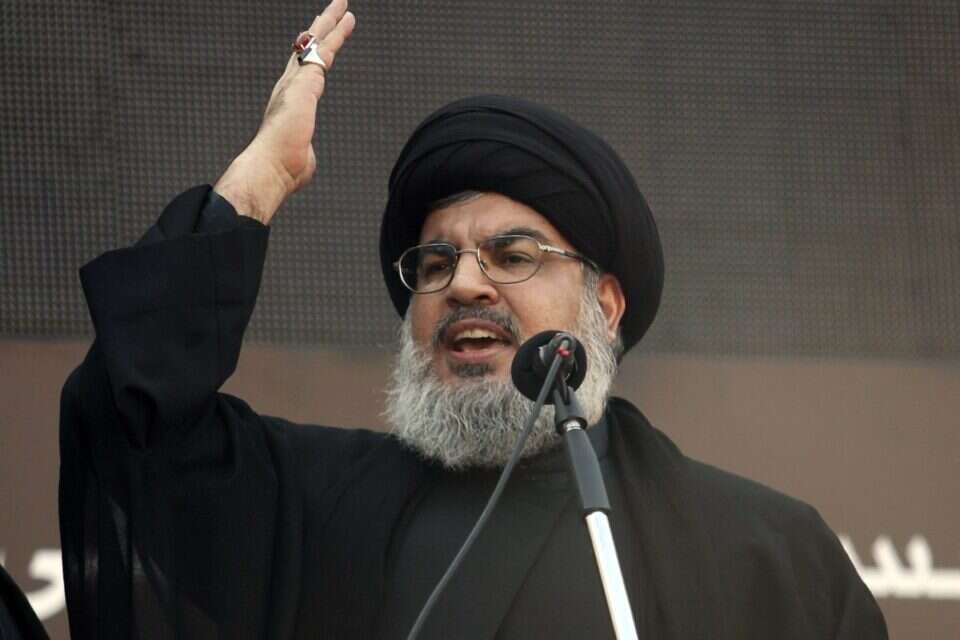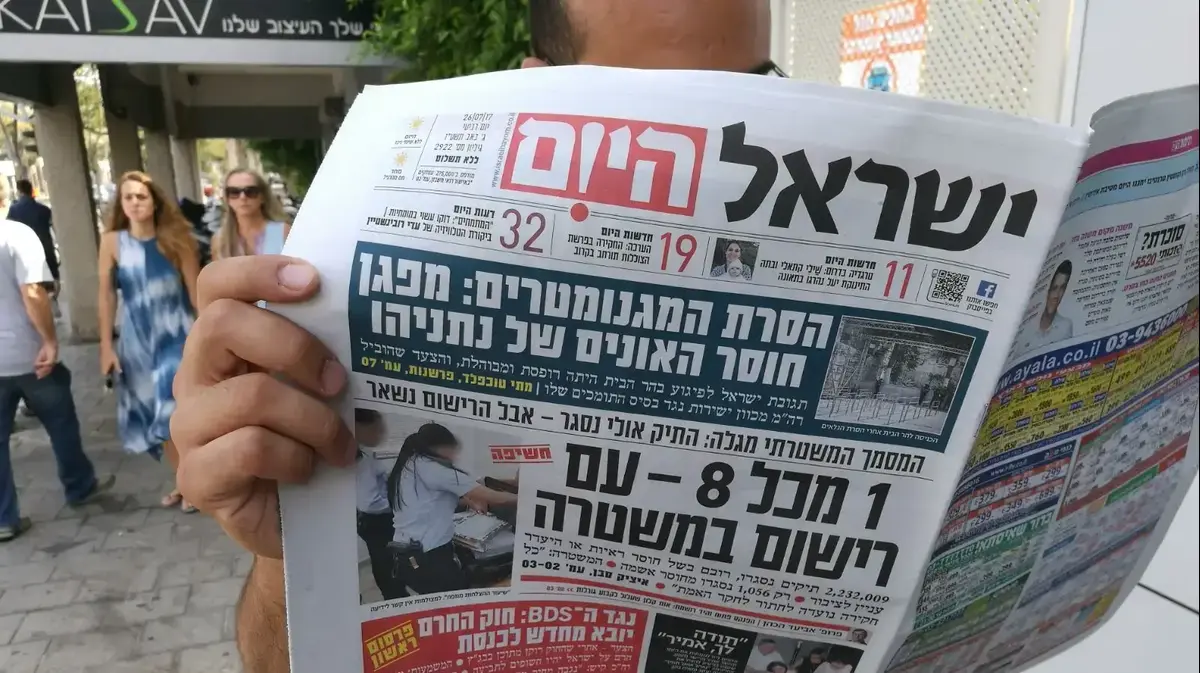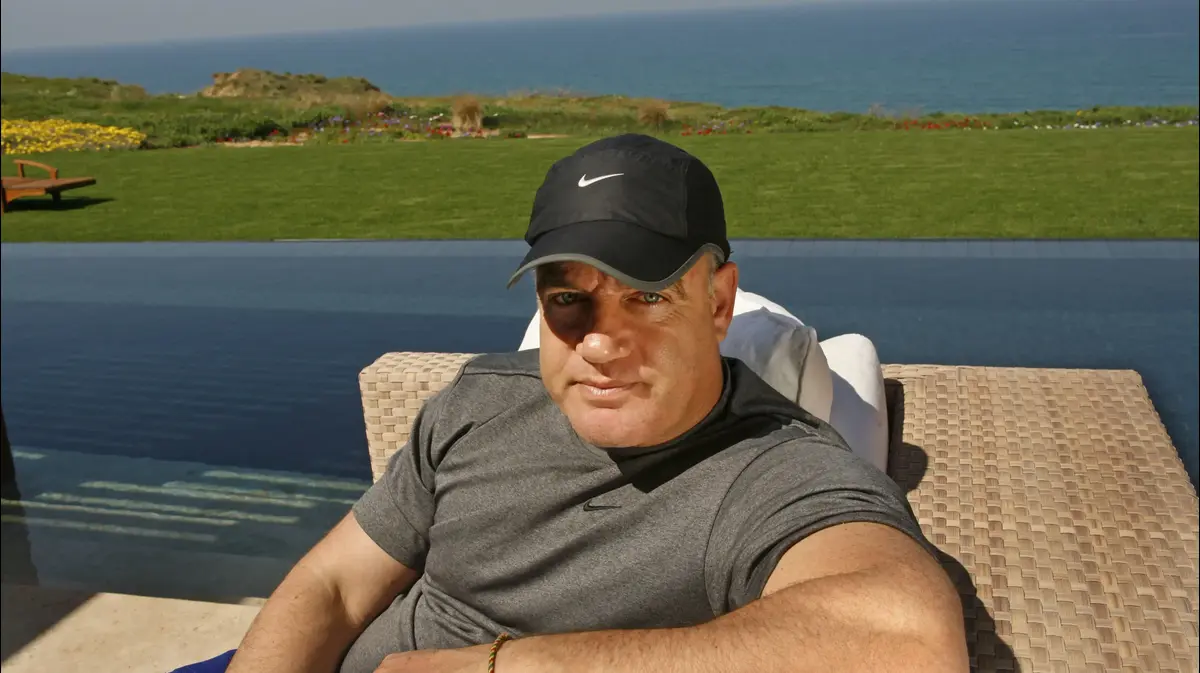Hezbollah is calculating a new route. As opposition to him grows in the heart of the Land of the Cedars, he sees new opportunities that may allow him to grow stronger and regain some of the public power he lost.
The military exercise in southern Lebanon a week ago was part of psychological warfare. Not only against Israel, but also against his enemies from within. But the effort to remind everyone who the landlord was got complicated. A series of parliamentarians condemned the showcase maneuver, referring to it as undermining state sovereignty and "taking the Lebanese hostage." Even the deputy speaker of parliament, Abdullah Bou Saab, complained that if the organization had consulted with him, he would have recommended a weapon-free exercise. In response, another exercise was promised on Saturday.
A drone with a Hezbollah flag during the exercise, photo: AFP
It is not for nothing that Nasrallah is trying to divert Lebanese attention southward. For more than six months there has been no president in Beirut because of a veto by the Hezbollah camp in parliament. The organization fell in love with the empty chair regime system, which they considered preferable to any figure "hostile to the resistance." But without a leadership capable of leading reforms, the economic situation is deteriorating. The Lebanese pound is plunging to new depths, and the maritime border agreement, which gave Beirut the potential Qana gas field, has yet to bear any fruit.
The diversion of attention is accompanied by the search for a new achievement, and Nasrallah signals the next goal. "Part of our country is under occupation," he declared on Thursday, referring to the points of contention on the land border with Israel. Another senior Hezbollah official, Nabil Qawq, provided clarification on Friday at a conference in Marj Ayoun: "We have come to emphasize our commitment to liberating the Shebaa Farms (Har Dov area; S.K.) and for the defense of our entire country." From these words, it seems that the fantasy is to impose on Israel an equation in the spirit of the maritime border agreement: threats that will lead to indirect negotiations and a complete withdrawal.
Hezbollah exercise, photo: AP
In the meantime, Nasrallah does not spare declarations. Faced with the Military Intelligence chief's statement that he was "close to a mistake that could lead to a major war," the secretary-general replied that it was Israel that was threatened with such a war, and that "any mistake in Gaza, the West Bank, Lebanon, Syria or Iran could lead to an explosion in the region." As is the custom of terrorist organizations today, he brandished the multi-front threat, even though in Operation Shield and Arrow Hezbollah and Hamas stood aside.
Iran has its own goals. In April, Quds Force commander Ismail Qaani visited Beirut and pulled the strings of the conflagration in the north. It is believed that Tehran is striving to engage Israel within its borders and distance it from the nuclear project, which is currently building a new bunker at Natanz and boasts a ballistic missile that can reach Tel Aviv.
Quds Force Commander Ismail Qaani, Photo: EPA
The convergence of interests between Nasrallah and the ayatollahs leads to a policy of provocation: military exercises, demonstrations and outposts of Hezbollah operatives near the border, drone infiltration attempts, and infiltration attempts. All this, while assessing in Hezbollah's circles that Israel is not interested in escalation in Lebanon. Ibrahim al-Amin, editor of the Hezbollah-affiliated newspaper Al-Akhbar, recently commented on this, noting that "we can talk about a new form of the contribution of the Lebanese resistance in aiding the Palestinian resistance project."
Cranes in Damascus and Moscow
At the same time, Hezbollah is developing two strategic levers: the first military from Damascus and the second economic from Moscow. Sources leaked to the Saudi Al-Hadath network that Hezbollah's Golan unit is training at the Addameer base north of Damascus to attack Israeli targets in the event of a flare-up on the Lebanese front.
Two US intelligence officials confirmed the report to FDD's Long War Journal. The unit reportedly gathers intelligence and trains in attacking American targets in Syria using tanks. It is headed by one, Musa Ali Daqduq, who is well known to Israel and the United States through the establishment of Shiite militias in Iraq and his activity in Syria. This front is intended to bridge the gap between Iranian and Lebanese interests. That is, to threaten Israel without endangering Beirut.
The Russian lever concerns the developing alliance between the Dahiya and the Kremlin. A recent article by Washington Institute researchers Aurora Ortega and Dr. Matthew Levitt sheds light on the growing web of webs between Putin and Nasrallah. US Treasury Department documents reveal how Russia collaborated with Iran and Hezbollah in oil smuggling as a route to "bypass sanctions." The cooperation began in 2018, with members of the terrorist organization meeting with senior Russian officials in Moscow and Beirut.
Russian President Putin, Photo: AP
For example, Hassan Muklad, Hezbollah's financial advisor who represents him in various transactions, is mentioned. Muklad is a partner in Hezbollah's buildup project, and his meetings with senior Russian officials have not stopped, even though he was flagged by the US sanctions system last January. In March, he again traveled to Russia for work meetings. He is in direct contact with a senior Hezbollah operative named Mohammed Kassir. The latter, in addition to his role in fundraising, is the head of Hezbollah's unit responsible for smuggling weapons from Syria to Lebanon.
Still, these are long-term levers. Behind the fog curtain of boastful talk, Hezbollah finds itself mediating between distress in the Lebanese arena and Iranian interests. Therefore, it seems that he is choosing the path of provocation for the time being. The problem is that what begins with provocation can end in escalation. In Islamic Jihad, learn this firsthand.
Wrong? We'll fix it! If you find a mistake in the article, please share with us















